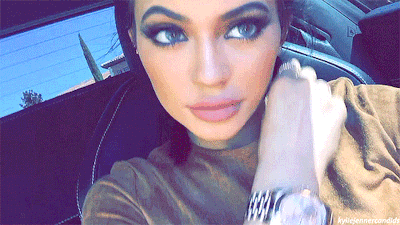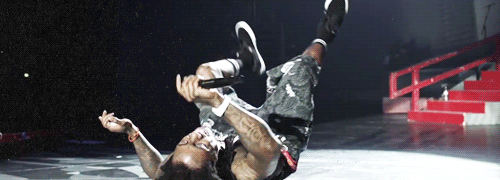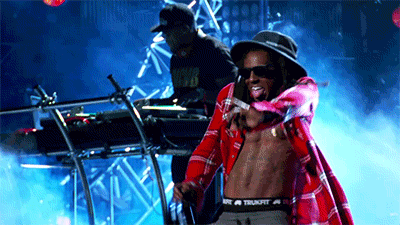I wrought this paper for ENG 101 Honor's Cohort about 2 years ago, gives a more in depth look into his song "Tie My Hands" and how the lyrics relate to the disaster that would have taken place in his hometown New Orleans. Let me know what you all think about it and if you learned anything new from it. Thanks!
9 September 2012
Lil Wayne & Katrina
The effects of Katrina would not only affect New Orleans born rapper, Lil Wayne, but also the majority of the lower class that lived there and the little help he feels, they received. On June 10, 2008, Lil Wayne released his most successful album ever called “Tha Carter III” which went platinum in only one week and was awarded with a Grammy for best rap album of the year. The album consisted of 16 tracks that targeted his core rap fans and tracks that targeted to pop fans (bio). One of the tracks, though, that would stand out would be “Tie My Hands ft. Robin Thicke”, where he speaks of the tragedy that happened to his hometown of New Orleans from Hurricane Katrina.
When Hurricane Katrina was first manifesting over the Bahamas on August 23, 2005, meteorologists warned U.S. Gulf States that it would be headed toward there. With the states at risk, New Orleans was in the line of fire for getting hit by Katrina. Once it was confirmed that Hurricane Katrina would hit New Orleans, the day prior, 80 percent of the city’s population had evacuated, while others went to the Superdome and some would stick it out at home. It was Monday, August 29, when the storm hit; the storm overcame many of the city’s weak levees and would eventually cover 80% of New Orleans with water (History.com).
The Aftermath of what happened in New Orleans resulted in some good and political controversies. There were people in New Orleans who were brave and helped many in need of rescue. The Federal Government, however, was not prepared to respond to such a catastrophe. FEMA (Federal Emergency Management Agency) had taken days to establish a plan and even then, there were many issues and concerns surrounding how much food, supplies, and clothing people needed (History.com).
The tragedy would capture Wayne’s attention, when he realized that a childhood friend that lived there died from Katrina (VH1). In his song, he expressed the hardships of how the lower class people of New Orleans felt helpless and undeserving of this adversity. As Robin Thicke sang the lyrics “You tie my hands, What am I supposed to see, What have I done so bad, What am I gonna be”, Wayne would start to blame the governor of Louisiana and mayor of New Orleans for not taking action and that the people would have to rely on each other to survive. Wayne emphasized his feelings and thoughts when he rapped, “No governor, no help from the mayor, Just a steady beating heart, and a wish and a prayer, Lets pray.”
With most of his memories of his homeland wiped away, he pledged to help. He went to his neighborhood and helped provide clothing, food, and supplies to the people struggling. A park where he used to play was destroyed and he donated 200 thousand dollars to rebuilding it (Katie Couric). Wayne would even start the “One Family Foundation”, which helped to rebuild athletic fields in the school he grew up in (bio). Wayne rapped about his contributions, singing these lyrics: “Yes, I know the process has so much stress, But its the progress that feels the best.”
Even after the hardships of Katrina, Lil Wayne still felt as though more could have been done for his hometown. Wayne was interviewed about what had been done for Haiti’s disaster by stating, “I think it's amazing what's been done for Haiti”, but respond with “But I also think it's amazing what hasn't been done for New Orleans”. Michael Hecht, president and CEO of Greater New Orleans Inc., would see Lil Wayne’s point “Perhaps there's some frustration on his part because it didn't arrive quickly enough or took too long to come online”, but would tell that “The New Orleans region since Katrina has been the recipient of tens of billions of dollars of assistance, not to mention scores of individuals who have committed their time and effort to rebuilding the city and region”. Karl Senner, a resident of New Orleans would say that “Also, I think responses to things like this has become an issue more so since Katrina. It was a learning experience for all of us” (Kaufman).
It was a devastating time for what happened in New Orleans, and it still haunts people to this day as Wayne rapped “I lost everything, but I ain’t the only one.” Wayne still remembered the effects of the hurricane and how the government did not do much for New Orleans immediately, however, was still grateful after the disaster passed. Wayne rapped “Yeah, some say tragedy is hard to get over, But some time that tragedy means its over.” He was also grateful for the people of New Orleans as they overcame the disaster in the hardest of times together. Wayne rapped “We got spirit y’all, We got spirit, We got soul y’all, We got soul, They don’t want us to see, but we already know.” This was a time of hardship for Wayne and New Orleans, and in the song, he expressed his truest and inner most feelings.
“Katie Couric’s ‘All Access’ Grammy Special.” Lil Wayne Interview. Narr. Katie Couric. Writ. Katie Couric. CBS. 4 Feb. 2009. Television
“VH1: Behind The Music.” Lil Wayne. Writ. Sean Gottlieb. VH1. 10 Sept. 2009. TelevisionKaufman, Gil. “New Orleans Natives React To Lil Wayne's 'We Are The World' Katrina Comment” Mtv. Viacom, 4 Feb. 2010. Web. 9 Sept. 2012
9 September 2012
Lil Wayne & Katrina
The effects of Katrina would not only affect New Orleans born rapper, Lil Wayne, but also the majority of the lower class that lived there and the little help he feels, they received. On June 10, 2008, Lil Wayne released his most successful album ever called “Tha Carter III” which went platinum in only one week and was awarded with a Grammy for best rap album of the year. The album consisted of 16 tracks that targeted his core rap fans and tracks that targeted to pop fans (bio). One of the tracks, though, that would stand out would be “Tie My Hands ft. Robin Thicke”, where he speaks of the tragedy that happened to his hometown of New Orleans from Hurricane Katrina.
When Hurricane Katrina was first manifesting over the Bahamas on August 23, 2005, meteorologists warned U.S. Gulf States that it would be headed toward there. With the states at risk, New Orleans was in the line of fire for getting hit by Katrina. Once it was confirmed that Hurricane Katrina would hit New Orleans, the day prior, 80 percent of the city’s population had evacuated, while others went to the Superdome and some would stick it out at home. It was Monday, August 29, when the storm hit; the storm overcame many of the city’s weak levees and would eventually cover 80% of New Orleans with water (History.com).
The Aftermath of what happened in New Orleans resulted in some good and political controversies. There were people in New Orleans who were brave and helped many in need of rescue. The Federal Government, however, was not prepared to respond to such a catastrophe. FEMA (Federal Emergency Management Agency) had taken days to establish a plan and even then, there were many issues and concerns surrounding how much food, supplies, and clothing people needed (History.com).
The tragedy would capture Wayne’s attention, when he realized that a childhood friend that lived there died from Katrina (VH1). In his song, he expressed the hardships of how the lower class people of New Orleans felt helpless and undeserving of this adversity. As Robin Thicke sang the lyrics “You tie my hands, What am I supposed to see, What have I done so bad, What am I gonna be”, Wayne would start to blame the governor of Louisiana and mayor of New Orleans for not taking action and that the people would have to rely on each other to survive. Wayne emphasized his feelings and thoughts when he rapped, “No governor, no help from the mayor, Just a steady beating heart, and a wish and a prayer, Lets pray.”
With most of his memories of his homeland wiped away, he pledged to help. He went to his neighborhood and helped provide clothing, food, and supplies to the people struggling. A park where he used to play was destroyed and he donated 200 thousand dollars to rebuilding it (Katie Couric). Wayne would even start the “One Family Foundation”, which helped to rebuild athletic fields in the school he grew up in (bio). Wayne rapped about his contributions, singing these lyrics: “Yes, I know the process has so much stress, But its the progress that feels the best.”
Even after the hardships of Katrina, Lil Wayne still felt as though more could have been done for his hometown. Wayne was interviewed about what had been done for Haiti’s disaster by stating, “I think it's amazing what's been done for Haiti”, but respond with “But I also think it's amazing what hasn't been done for New Orleans”. Michael Hecht, president and CEO of Greater New Orleans Inc., would see Lil Wayne’s point “Perhaps there's some frustration on his part because it didn't arrive quickly enough or took too long to come online”, but would tell that “The New Orleans region since Katrina has been the recipient of tens of billions of dollars of assistance, not to mention scores of individuals who have committed their time and effort to rebuilding the city and region”. Karl Senner, a resident of New Orleans would say that “Also, I think responses to things like this has become an issue more so since Katrina. It was a learning experience for all of us” (Kaufman).
It was a devastating time for what happened in New Orleans, and it still haunts people to this day as Wayne rapped “I lost everything, but I ain’t the only one.” Wayne still remembered the effects of the hurricane and how the government did not do much for New Orleans immediately, however, was still grateful after the disaster passed. Wayne rapped “Yeah, some say tragedy is hard to get over, But some time that tragedy means its over.” He was also grateful for the people of New Orleans as they overcame the disaster in the hardest of times together. Wayne rapped “We got spirit y’all, We got spirit, We got soul y’all, We got soul, They don’t want us to see, but we already know.” This was a time of hardship for Wayne and New Orleans, and in the song, he expressed his truest and inner most feelings.
Bibliography
Lil Wayne. “Tie My Hands ft. Robin Thicke.” Tha Carter III. Cash Money, 2008. CD.“Katie Couric’s ‘All Access’ Grammy Special.” Lil Wayne Interview. Narr. Katie Couric. Writ. Katie Couric. CBS. 4 Feb. 2009. Television
“VH1: Behind The Music.” Lil Wayne. Writ. Sean Gottlieb. VH1. 10 Sept. 2009. Television
“Lil Wayne biography.” bio. true story. A+E Television Networks, LLC. 2012. Web. 9 Sept. 2012
“Hurricane Katrina.” History.com. A&E Television Networks, LLC, 1996-2012. Web. 9 Sept. 2012
“Hurricane Katrina.” History.com. A&E Television Networks, LLC, 1996-2012. Web. 9 Sept. 2012














Comment